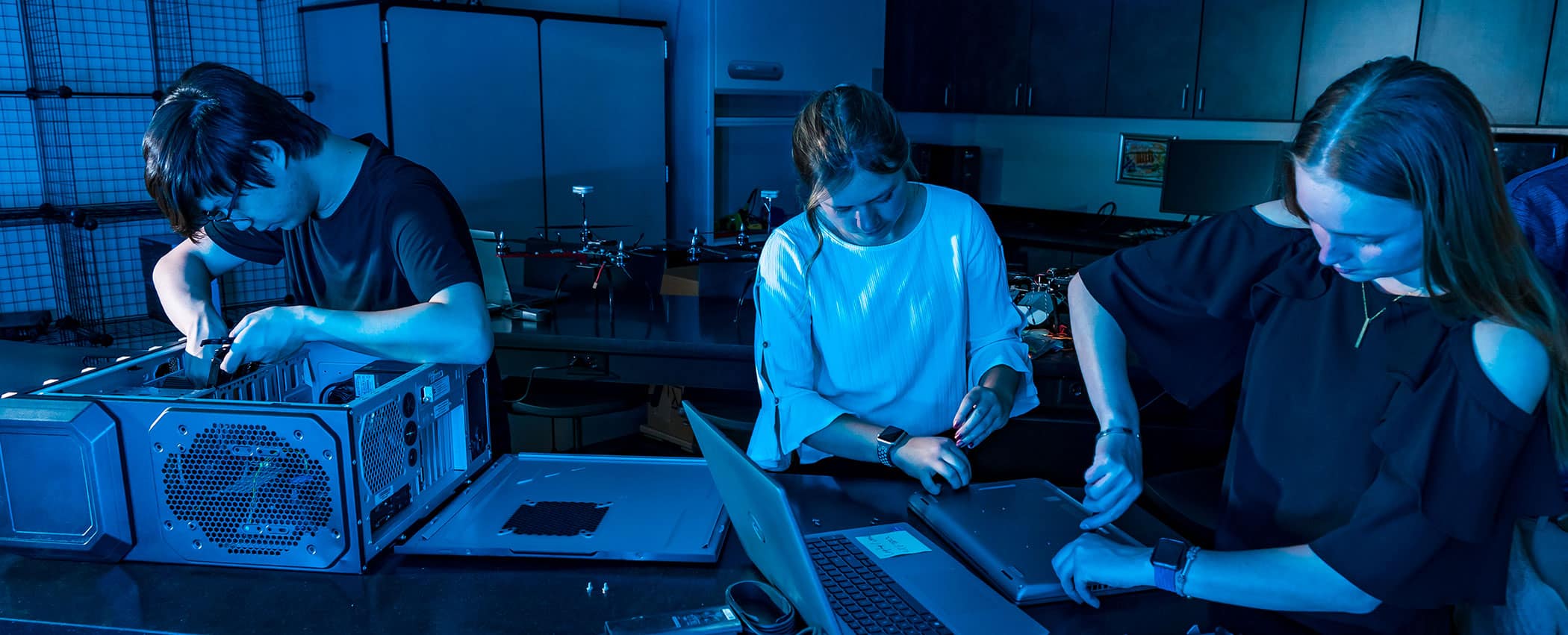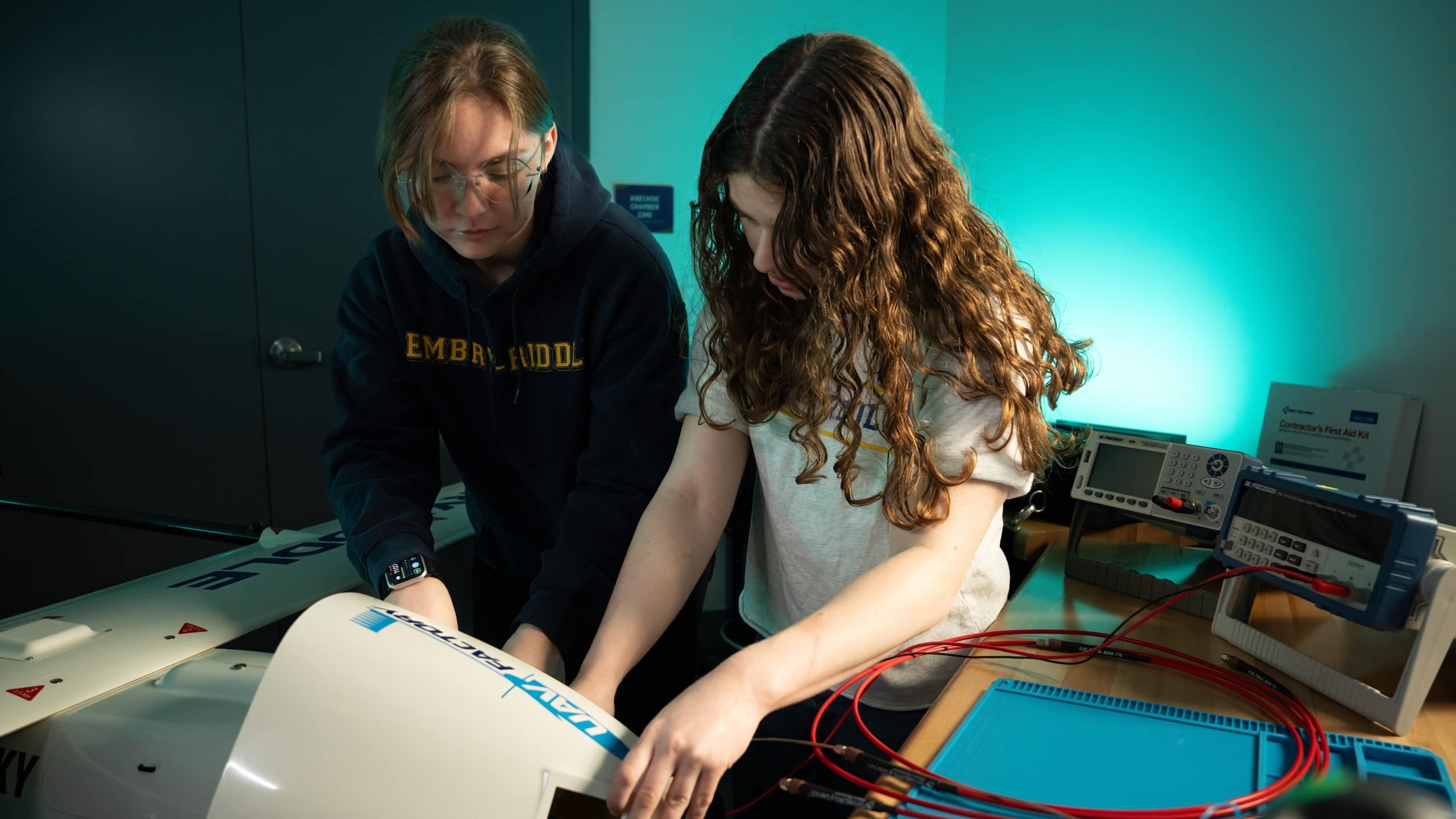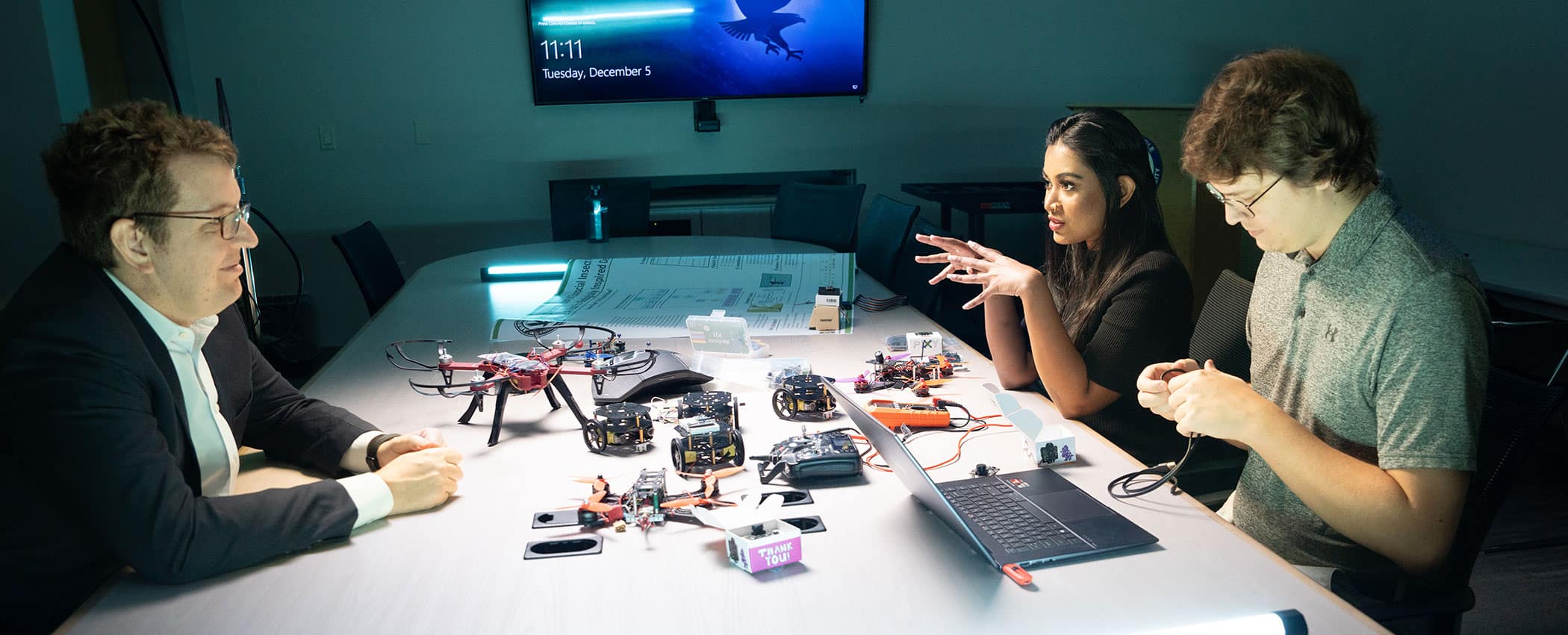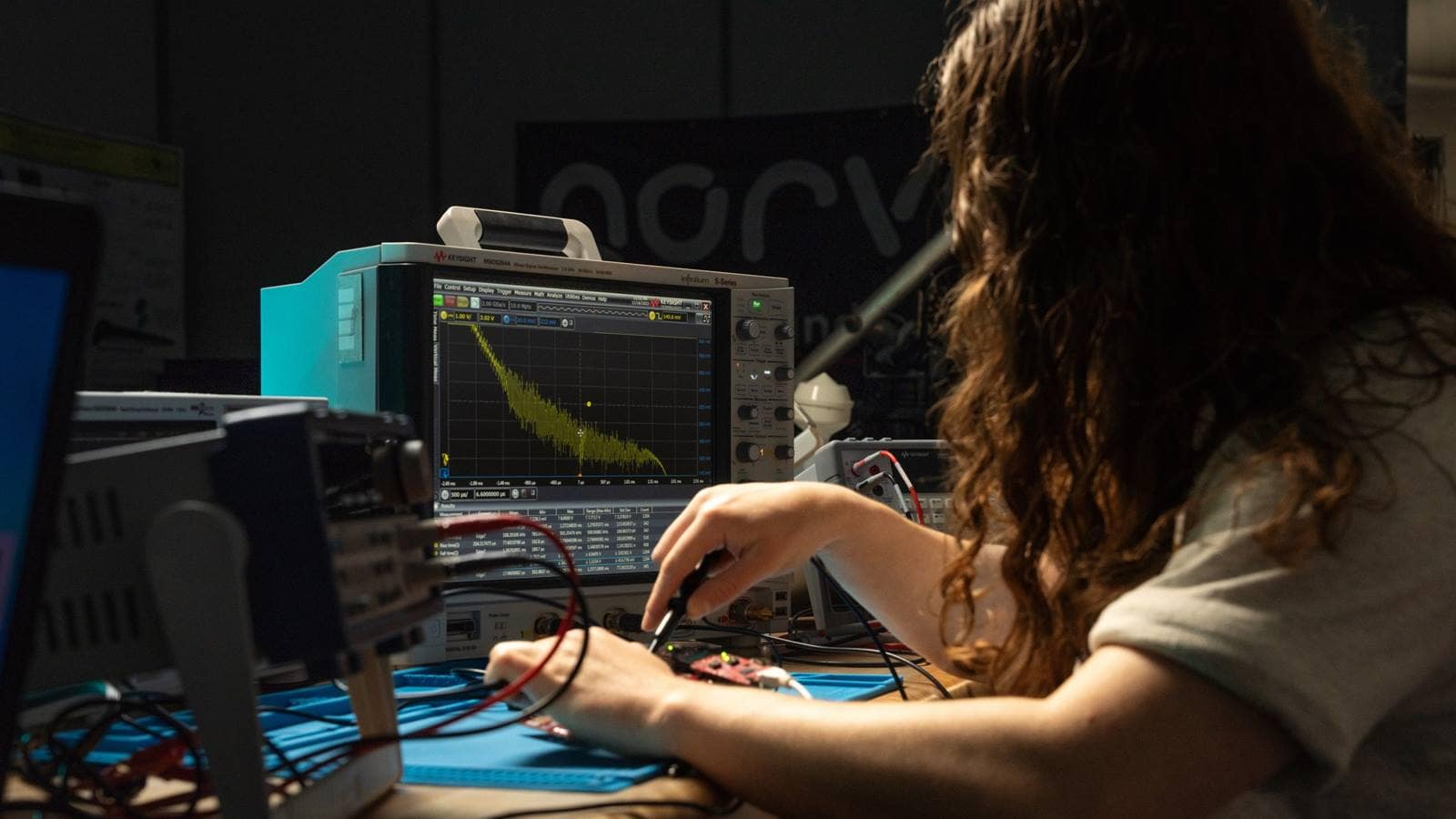
Bachelor of Science in
Electrical Engineering
The Bachelor of Science in Electrical Engineering provides hands-on experience in engineering through systems thinking, circuit theory and control systems.
About the Bachelor of Science in Electrical Engineering
The Bachelor of Science degree in Electrical Engineering provides students with a broad background in circuit theory, communication systems, computers, control systems, electromagnetic fields, energy sources and electronic devices. Program faculty are leading experts in avionics and systems thinking who immerse students in real-world scenarios and empower them to think as an engineer.
Throughout the Electrical Engineering curriculum, students are educated in the discipline’s theory and receive practical hands-on experience, culminating with the highly regarded senior capstone course that follows the development cycle of an actual engineering project.
While earning an Electrical Engineering degree, you will have the opportunity to:
- Identify, formulate and solve complex engineering problems by applying principles of engineering, science and mathematics.
- Apply engineering design to produce solutions that meet specified needs with consideration of public health, safety and welfare, as well as global, cultural, social, environmental and economic factors.
- Communicate effectively with a range of audiences.
- Recognize ethical and professional responsibilities in engineering situations and make informed judgments, which must consider the impact of engineering solutions in global, economic, environmental and societal contexts.
- Function effectively on a team whose members together provide leadership, create a collaborative and inclusive environment, establish goals, plan tasks and meet objectives.
- Develop and conduct appropriate experimentation, analyze and interpret data and use engineering judgment to draw conclusions.
- Acquire and apply new knowledge as needed, using appropriate learning strategies.
Electrical Engineering Career Opportunities
Careers and Employers
With a high placement rate of 100% within a year of graduation, Embry-Riddle Electrical Engineering graduates are set to enter the workforce in various fields, including test engineering, design engineering, electronics engineering and electrical engineering.
Students earning an Electrical Engineering degree often accept employment offers from top companies such as Textron, The Boeing Company, Northrop Grumman, Garmin and the U.S. Military.
Electrical Engineering Salary Information
Receiving a degree in Electrical Engineering from Embry-Riddle provides alumni the opportunity for competitive salaries, averaging $80,200 annually as of 2022.
DETAILS
This offering is available at the following campuses. Select a campus to learn more.
About Electrical Engineering at the Daytona Beach, FL Campus
The B.S. in Electrical Engineering at Daytona Beach is built around hands-on projects like the telemetry system of autonomous aircraft or power switching for a hybrid car. Housed in the Department of Electrical Engineering and Computer Science, graduates enter the workforce equipped to handle systems thinking, circuit theory and control systems.
The program includes a general education core of speech and college success, introductions to engineering and computing, plus courses in calculus, analytical geometry and physics for engineers.
Electrical Engineering Information
- Credits: 129
- Online or In-Person: In-Person
- Capstone Option: 6 credit hours
Professional Accreditation
The Bachelor of Science in Electrical Engineering is accredited by the Engineering Accreditation Commission of ABET, under the commission’s General Criteria and Program Criteria for Electrical, Computer, Communications, Telecommunication(s), and Similarly Named Engineering Programs.
Details about Program Educational Outcomes, Student Learning Outcomes and Enrollment Data can be found on our Electrical Engineering Program Accreditation Information page.
Helpful Links
- Tour our Daytona Beach Campus
- Discover the Department’s Faculty
- Explore the Fields of Study: Engineering & Computers & Technology
- Find Related Clubs & Organizations
Student Learning Outcomes
Students will:
- Have an ability to to identify, formulate, and solve complex engineering problems by applying principles of engineering, science, and mathematics.
- Have an ability to apply engineering design to produce solutions that meet specified needs with consideration of public health, safety, and welfare, as well as global, cultural, social, environmental, and economic factors.
- Have an ability to communicate effectively with a range of audiences.
- Have an ability to recognize ethical and professional responsibilities in engineering situations and make informed judgments, which must consider the impact of engineering solutions in global, economic, environmental, and societal contexts.
- Have an ability to function effectively on a team whose members together provide leadership, create a collaborative and inclusive environment, establish goals, plan tasks, and meet objectives.
- Have an ability to develop and conduct appropriate experimentation, analyze and interpret data, and use engineering judgment to draw conclusions.
- Have an ability to acquire and apply new knowledge as needed, using appropriate learning strategies.
General Education Requirements
For a full description of Embry-Riddle General Education guidelines, please see the General Education section of this catalog. These minimum requirements are applicable to all degree programs.
| Communication Theory & Skills (COM 122, COM 219, COM 221) | 9 | |
| Lower-Level Humanities | 3 | |
| Lower-Level Social Sciences | 3 | |
| Lower or Upper-Level Humanities or Social Sciences | 3 | |
| Upper-Level Humanities or Social Sciences | 3 | |
| Computer Science (CS 223) | 3 | |
| Mathematics (MA 241 & MA 242) | 8 | |
| Physical and Life Sciences - (PS 150, PS 160 & PS 253) | 7 | |
| Total Credits | 39 | |
| Professional Preparation | ||
| EGR 101 | Introduction to Engineering | 2 |
| UNIV 101 | College Success | 1 |
| Mathematics | ||
| MA 243 | Calculus and Analytical Geometry III | 4 |
| MA 345 | Differential Equations and Matrix Methods | 4 |
| MA 412 | Probability and Statistics | 3 |
| MA 441 | Mathematical Methods for Engineering and Physics I | 3 |
| Physical Science | ||
| PS 250 | Physics for Engineers III | 3 |
| Computer Engineering | ||
| CEC 220 | Digital Circuit Design | 3 |
| CEC 222 | Digital Circuit Design Laboratory | 1 |
| CEC 315 | Signals and Systems | 3 |
| CEC 320 | Microprocessor Systems | 3 |
| CEC 322 | Microprocessor Systems Laboratory | 1 |
| CEC 410 | Digital Signal Processing | 3 |
| CEC 411 | Digital Signal Processing Laboratory | 1 |
| Computer Science | ||
| CS 344 | C Programming and UNIX | 3 |
| Electrical Engineering | ||
| EE 223 | Linear Circuits Analysis I | 3 |
| EE 224 | Electrical Engineering Laboratory I | 1 |
| EE 300 | Linear Circuits Analysis II | 3 |
| EE 302 | Electronic Devices and Circuits | 3 |
| EE 304 | Electronic Circuits Laboratory | 1 |
| EE 307 | Avionics I | 3 |
| EE 308 | Introduction to Electrical Communications | 3 |
| EE 340 | Electric and Magnetic Fields | 3 |
| EE 401 | Control Systems Analysis and Design | 3 |
| EE 402 | Control Systems Laboratory | 1 |
| EE 417 | Digital Communications | 3 |
| EE 420 | Electrical Engineering Capstone I | 3 |
| EE 421 | Electrical Engineering Capstone II | 3 |
| EE 430 | Introduction to Radio Frequency Circuits | 3 |
| EE 430L | Radio Frequency Circuits Laboratory | 1 |
| Systems Engineering | ||
| SYS 301 | Introduction to Systems Engineering | 3 |
| Required Electives | ||
| CEC/CS/EE/SE Upper-Level Elective | 3 | |
| Specified Electives * | 9 | |
| Total Credits | 90 | |
| Total Degree Credits | 129 | |
- *
Approved by Program Coordinator
Suggested Plan of Study
Students should be aware that several courses in each academic year may have prerequisites and/or corequisites (check the course descriptions before registering for classes to ensure requisite sequencing).
See the Common Year One outline in the Engineering Fundamentals Program Introduction. CS 223 is a required course for this degree program.
| Year One | ||
|---|---|---|
| Credits | ||
| See the common Year One outline in the College of Engineering introduction. | 33 | |
| Credits Subtotal | 33.0 | |
| Year Two | ||
| CEC 320 | Microprocessor Systems | 3 |
| CEC 322 | Microprocessor Systems Laboratory | 1 |
| COM 221 | Technical Report Writing | 3 |
| MA 243 | Calculus and Analytical Geometry III | 4 |
| PS 250 | Physics for Engineers III | 3 |
| PS 253 | Physics Laboratory for Engineers | 1 |
| HU/SS Lower-Level Elective | 3 | |
| CEC 315 | Signals and Systems | 3 |
| EE 223 | Linear Circuits Analysis I | 3 |
| EE 224 | Electrical Engineering Laboratory I | 1 |
| MA 345 | Differential Equations and Matrix Methods | 4 |
| PS 160 | Physics for Engineers II | 3 |
| Credits Subtotal | 32.0 | |
| Year Three | ||
| EE 308 | Introduction to Electrical Communications | 3 |
| HU/SS Upper Level | 3 | |
| EE 302 | Electronic Devices and Circuits | 3 |
| EE 304 | Electronic Circuits Laboratory | 1 |
| EE 300 | Linear Circuits Analysis II | 3 |
| MA 441 | Mathematical Methods for Engineering and Physics I | 3 |
| CS 344 | C Programming and UNIX | 3 |
| EE 307 | Avionics I | 3 |
| CEC/EE/SE/CS Upper Level | 3 | |
| EE 340 | Electric and Magnetic Fields | 3 |
| MA 412 | Probability and Statistics | 3 |
| Credits Subtotal | 31.0 | |
| Year Four | ||
| EE 420 | Electrical Engineering Capstone I | 3 |
| Specified Electives | 9 | |
| CEC 410 | Digital Signal Processing | 3 |
| CEC 411 | Digital Signal Processing Laboratory | 1 |
| EE 430 | Introduction to Radio Frequency Circuits | 3 |
| EE 430L | Radio Frequency Circuits Laboratory | 1 |
| SYS 301 | Introduction to Systems Engineering | 3 |
| EE 421 | Electrical Engineering Capstone II | 3 |
| EE 417 | Digital Communications | 3 |
| EE 401 | Control Systems Analysis and Design | 3 |
| EE 402 | Control Systems Laboratory | 1 |
| Credits Subtotal | 33.0 | |
| Credits Total: | 129.0 | |
Get Started Now:
Summary
129 Credits
Estimate your tuition by using the Tuition Calculator
View Financial Aid Information
Learn about our General Education
Find out about transferring credits to this degree
Learn more about our Veterans & Military benefits
View our Academic Calendar
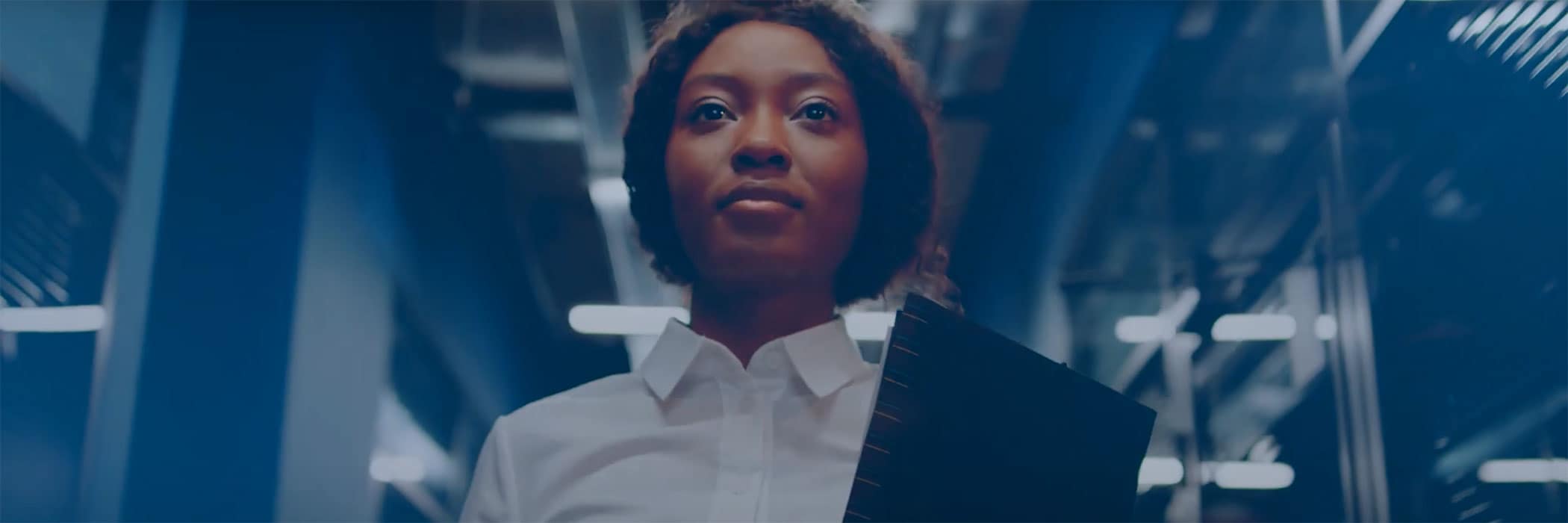
About Electrical Engineering at the Prescott, AZ Campus
The Bachelor of Science in Electrical Engineering provides an opportunity for students to develop a broad background in circuit theory, communication systems, computers and control systems. The Electrical Engineering degree is housed in the Department of Computer, Electrical and Software Engineering and is located on the Prescott Campus, home to the state-of-the-art King Engineering and Technology Center.
The program emphasizes design and culminates in a senior-year capstone project that teams electrical engineering students with students from the aerospace and software engineering programs.
Tracks/Specialties and/or Certificates
Students pursuing an electrical engineering degree have the option to complete the following track:
- Robotics
Electrical Engineering Information
- Credits: 125
- Online or In-Person: In-Person
- Capstone Option: 6 credit hours
Professional Accreditation
The Electrical Engineering and Computer Science programs are accredited by the Engineering Accreditation Commission of ABET, www.abet.org, under the General Criteria and the Electrical and Electronics Engineering Program Criteria.
Helpful Links
- Tour our Prescott Campus
- Discover the Department's Faculty
- Explore the Fields of Study: Engineering & Computers & Technology
- Find Related Clubs & Organizations
Student Learning Outcomes
Students will:
- Have an ability to to identify, formulate, and solve complex engineering problems by applying principles of engineering, science, and mathematics.
- Have an ability to apply engineering design to produce solutions that meet specified needs with consideration of public health, safety, and welfare, as well as global, cultural, social, environmental, and economic factors.
- Have an ability to communicate effectively with a range of audiences.
- Have an ability to recognize ethical and professional responsibilities in engineering situations and make informed judgments, which must consider the impact of engineering solutions in global, economic, environmental, and societal contexts.
- Have an ability to function effectively on a team whose members together provide leadership, create a collaborative and inclusive environment, establish goals, plan tasks, and meet objectives.
- Have an ability to develop and conduct appropriate experimentation, analyze and interpret data, and use engineering judgment to draw conclusions.
- Have an ability to acquire and apply new knowledge as needed, using appropriate learning strategies.
Degree Requirements
The Bachelor of Science in Electrical Engineering requires the successful completion of a minimum of 125 credit hours. Students should be aware that several courses in each academic year may have prerequisites and/or corequisites. The B.S. degree requires a minimum cumulative grade point average of 2.00 in all EE, ES, CEC, EGR, and CS courses that fulfill any degree requirement.
The Electrical Engineering degree includes a space option in which EP 394, AE 427, and AE 445 will be taken for the ES elective, EE 420, and EE 421.
Students who are interested in robotics may take a robotics track within the EE program. The suggested program of study follows the regular EE degree plan.
Electrical engineering majors are required to have a grade of C or better in all prerequisite courses for courses with the CS, CEC, EE, EGR, ES, or SE prefixes specifically listed in the catalog as required for the major.
Program Requirements
General Education
Embry-Riddle degree programs require students to complete a minimum of 36 hours of General Education coursework. For a full description of Embry-Riddle General Education guidelines, please see the General Education section of this catalog.
Students may choose other classes outside of their requirements, but doing so can result in the student having to complete more than the degree's 125-126 credit hours. This will result in additional time and cost to the student.
| Communication Theory and Skills | 9 | |
| Computer Science/Information Technology | 3 | |
| Mathematics | 6 | |
| Physical and Life Sciences (Natural Sciences) | 6 | |
| Humanities and Social Sciences | 12 | |
3 hours of lower-level Humanities | ||
3 hours of lower-level Social Science | ||
3 hours of lower-level or upper-level Humanities or Social Science | ||
3 hours of upper-level Humanities or Social Science | ||
| Total Credits | 36 | |
Electrical Engineering Core (110 Credits)
The following course of study outlines the quickest and most cost-efficient route for students to earn their B.S. in Electrical Engineering. Students are encouraged to follow the course of study to ensure they complete all program required courses and their prerequisites within four years.
Courses in the core with a # will satisfy general education requirements.
| CEC 220 | Digital Circuit Design | 3 |
| CEC 222 | Digital Circuit Design Laboratory | 1 |
| CEC 320 | Microprocessor Systems | 3 |
| CEC 322 | Microprocessor Systems Laboratory | 1 |
| COM 122 | English Composition # | 3 |
| COM 219 | Speech # | 3 |
| COM 221 | Technical Report Writing (Must earn a C or better to pass COM 221) # | 3 |
| CS 125 | Computer Science I # | 4 |
| EC 225 | Engineering Economics # | 3 |
| EE 223 | Linear Circuits Analysis I | 3 |
| EE 224 | Electrical Engineering Laboratory I | 1 |
| EE 302 | Electronic Devices and Circuits | 3 |
| EE 304 | Electronic Circuits Laboratory | 1 |
| EE 314 | Signal and Linear System Analysis | 3 |
| EE 315 | Signal and Linear System Analysis Laboratory | 1 |
| EE 340 | Electric and Magnetic Fields | 3 |
| EE 401 | Control Systems Analysis and Design | 3 |
| EE 402 | Control Systems Laboratory | 1 |
| EE 410 | Communication Systems | 3 |
| EE 412 | Communication Systems Laboratory | 1 |
| EE 420 | Electrical Engineering Capstone I | 3 |
| EE 421 | Electrical Engineering Capstone II | 3 |
| EE 450 | Elements of Power Systems | 3 |
| EE 452 | Power Systems Laboratory | 1 |
| EGR 101 | Introduction to Engineering | 2 |
| EGR 115 | Introduction to Computing for Engineers | 3 |
| ES 207 | Fundamentals of Mechanics | 3 |
| ES 312 | Energy Transfer Fundamentals | 3 |
| ES Core Selection (See course list below) | 3 | |
| General Education - lower-level or upper-level Humanities or Social Science # | 3 | |
| General Education - lower-level Humanities # | 3 | |
| HU 330 | Values and Ethics # | 3 |
| or HU 335 | Technology and Modern Civilization | |
| MA 241 | Calculus and Analytical Geometry I # | 4 |
| MA 242 | Calculus and Analytical Geometry II # | 4 |
| MA 243 | Calculus and Analytical Geometry III | 4 |
| MA 345 | Differential Equations and Matrix Methods | 4 |
| MA 412 | Probability and Statistics | 3 |
| MA 441 | Mathematical Methods for Engineering and Physics I | 3 |
| PS 161 | Physics I & II for Engineers # | 4 |
| PS 250 | Physics for Engineers III # | 3 |
| PS 253 | Physics Laboratory for Engineers # | 1 |
Advanced Electives (6-7 Credits)
| Advanced Electives / EE 4XX (selected from a list provided by the department chair) | 6-7 | |
Technical Electives (9 Credits)
| Technical Electives | 9 | |
| Technical electives include EGR 200, EGR 201, CS 225, SIS 365, and any AE, CEC, CEXX (Coop/Internship), CS, EE, EP, ES, MA, ME, PS, SE, or SYS course 300 level or above. Other courses may be approved by the CESE Department Chair. | ||
| ROTC Exceptions must be approved by the CESE Department Chair. | ||
| Total Credits | 125-126 | |
ES Core Selection (3 Credits)
| EGR 200 | Computer Aided Design of Aerospace Systems | 3 |
| EGR 201 | Computer Aided Design of Mechanical Systems | 3 |
| EGR 402 | Application of Advanced CATIA Methods | 3 |
| EP 394 | Space Systems Engineering | 3 |
| ES 206 | Fluid Mechanics | 3 |
| ES 306 | Fiber Optics | 3 |
| ES 315 | Space Environment and Effects | 3 |
| ES 320 & ES 321 | Engineering Materials Science and Engineering Materials Science Laboratory | 3 |
| ES 322 & ES 323 | Aerospace Engineering Failure and Aerospace Engineering Failure Laboratory | 3 |
| ES 324 & ES 325 | Measurements and Instrumentation and Measurements and Instrumentation Lab | 3 |
| ES 412 | Structural Dynamics | 3 |
| Other courses may be approved by the CESE Department Chair - Example: Directed Study | ||
Robotics Option
Electrical Engineering Core (122 Credits)
| CEC 220 | Digital Circuit Design | 3 |
| CEC 222 | Digital Circuit Design Laboratory | 1 |
| CEC 320 | Microprocessor Systems | 3 |
| CEC 322 | Microprocessor Systems Laboratory | 1 |
| COM 122 | English Composition # | 3 |
| COM 221 | Technical Report Writing # | 3 |
| COM 420 | Advanced Technical Communication I # | 1 |
| COM 430 | Advanced Technical Communication II # | 2 |
| CS 125 | Computer Science I # | 4 |
| EC 225 | Engineering Economics # | 3 |
| EE 223 | Linear Circuits Analysis I | 3 |
| EE 224 | Electrical Engineering Laboratory I | 1 |
| EE 302 | Electronic Devices and Circuits | 3 |
| EE 304 | Electronic Circuits Laboratory | 1 |
| EE 314 | Signal and Linear System Analysis | 3 |
| EE 315 | Signal and Linear System Analysis Laboratory | 1 |
| EE 340 | Electric and Magnetic Fields | 3 |
| EE 401 | Control Systems Analysis and Design | 3 |
| EE 402 | Control Systems Laboratory | 1 |
| EE 410 | Communication Systems | 3 |
| EE 412 | Communication Systems Laboratory | 1 |
| EE 450 | Elements of Power Systems | 3 |
| EE 452 | Power Systems Laboratory | 1 |
| EGR 101 | Introduction to Engineering | 2 |
| EGR 115 | Introduction to Computing for Engineers | 3 |
| ES 204 | Dynamics | 3 |
| ES 207 | Fundamentals of Mechanics | 3 |
| ES 312 | Energy Transfer Fundamentals | 3 |
| General Education - lower-level or upper-level Humanities or Social Science # | 3 | |
| General Education - lower-level Humanities # | 3 | |
| HU 330 | Values and Ethics # | 3 |
| or HU 335 | Technology and Modern Civilization | |
| MA 241 | Calculus and Analytical Geometry I # | 4 |
| MA 242 | Calculus and Analytical Geometry II # | 4 |
| MA 243 | Calculus and Analytical Geometry III | 4 |
| MA 335 | Introduction to Linear and Abstract Algebra | 3 |
| MA 345 | Differential Equations and Matrix Methods | 4 |
| MA 412 | Probability and Statistics | 3 |
| MA 441 | Mathematical Methods for Engineering and Physics I | 3 |
| ME 302 | Introduction to Robotics I | 3 |
| ME 406 | Robotics II | 3 |
| ME 406L | Robotics II Laboratory | 1 |
| ME 407 | Preliminary Design for Robotic Systems with Laboratory | 4 |
| ME 420 | Detail Design of Robotic Systems with Laboratory | 4 |
| PS 161 | Physics I & II for Engineers # | 4 |
| PS 250 | Physics for Engineers III # | 3 |
| PS 253 | Physics Laboratory for Engineers # | 1 |
Advanced Electives (3-4 Credits)
| Advanced Electives (selected from a list provided by the department chair) | 3-4 | |
| Total Credits | 125-126 | |
- #
General Education Course
UNIV 101 is taken in excess of degree requirements.
All Army ROTC students are required to complete SS 321 - U.S. Military History 1900-Present (3 credits) in order to commission.
General Track - Suggested Plan of Study
| Freshman Year | ||
|---|---|---|
| Fall | Credits | |
| COM 122 | English Composition | 3 |
| Humanities or Social Science Lower-Level or Upper-Level Elective | 3 | |
| EGR 101 | Introduction to Engineering | 2 |
| EGR 115 | Introduction to Computing for Engineers | 3 |
| MA 241 | Calculus and Analytical Geometry I | 4 |
| UNIV 101 | College Success | (1) |
| Credits Subtotal | 15.0 | |
| Spring | ||
| CEC 220 | Digital Circuit Design | 3 |
| CEC 222 | Digital Circuit Design Laboratory | 1 |
| Humanities Lower-Level Elective | 3 | |
| MA 242 | Calculus and Analytical Geometry II | 4 |
| PS 161 | Physics I & II for Engineers | 4 |
| Credits Subtotal | 15.0 | |
| Sophomore Year | ||
| Fall | ||
| COM 221 | Technical Report Writing (Must earn a C or better to pass COM 221) | 3 |
| CS 125 | Computer Science I | 4 |
| MA 243 | Calculus and Analytical Geometry III | 4 |
| PS 250 | Physics for Engineers III | 3 |
| PS 253 | Physics Laboratory for Engineers | 1 |
| Credits Subtotal | 15.0 | |
| Spring | ||
| CEC 320 | Microprocessor Systems | 3 |
| CEC 322 | Microprocessor Systems Laboratory | 1 |
| COM 219 | Speech | 3 |
| EE 223 | Linear Circuits Analysis I | 3 |
| EE 224 | Electrical Engineering Laboratory I | 1 |
| MA 345 | Differential Equations and Matrix Methods | 4 |
| Credits Subtotal | 15.0 | |
| Junior Year | ||
| Fall | ||
| EE 302 | Electronic Devices and Circuits | 3 |
| EE 304 | Electronic Circuits Laboratory | 1 |
| EE 314 | Signal and Linear System Analysis | 3 |
| EE 315 | Signal and Linear System Analysis Laboratory | 1 |
| ES 207 | Fundamentals of Mechanics | 3 |
| MA 441 | Mathematical Methods for Engineering and Physics I | 3 |
| Technical Elective | 3 | |
| Credits Subtotal | 17.0 | |
| Spring | ||
| EE 340 | Electric and Magnetic Fields | 3 |
| EE 401 | Control Systems Analysis and Design | 3 |
| EE 402 | Control Systems Laboratory | 1 |
| Engineering Science Core Selection | 3 | |
| ES 312 | Energy Transfer Fundamentals | 3 |
| MA 412 | Probability and Statistics | 3 |
| Credits Subtotal | 16.0 | |
| Senior Year | ||
| Fall | ||
| EE 410 | Communication Systems | 3 |
| EE 412 | Communication Systems Laboratory | 1 |
| EE 420 | Electrical Engineering Capstone I | 3 |
| EE 450 | Elements of Power Systems | 3 |
| EE 452 | Power Systems Laboratory | 1 |
| Technical Electives | 6 | |
| Credits Subtotal | 17.0 | |
| Spring | ||
| Advanced Electives / EE 4xx | 6-7 | |
| EC 225 | Engineering Economics | 3 |
| EE 421 | Electrical Engineering Capstone II | 3 |
| HU 330 | Values and Ethics | 3 |
or HU 335
|
Technology and Modern Civilization | |
| Credits Subtotal | 15.0-16.0 | |
| Credits Total: | 125.0-126.0 | |
Robotics Track - Suggested Plan of Study
| Freshman Year | ||
|---|---|---|
| Fall | Credits | |
| COM 122 | English Composition | 3 |
| Humanities or Social Science Lower-Level or Upper-Level Elective | 3 | |
| EGR 101 | Introduction to Engineering | 2 |
| EGR 115 | Introduction to Computing for Engineers | 3 |
| MA 241 | Calculus and Analytical Geometry I | 4 |
| UNIV 101 | College Success | (1) |
| Credits Subtotal | 15.0 | |
| Spring | ||
| CEC 220 | Digital Circuit Design | 3 |
| CEC 222 | Digital Circuit Design Laboratory | 1 |
| Humanities Lower-Level Elective | 3 | |
| MA 242 | Calculus and Analytical Geometry II | 4 |
| PS 161 | Physics I & II for Engineers | 4 |
| Credits Subtotal | 15.0 | |
| Sophomore Year | ||
| Fall | ||
| COM 221 | Technical Report Writing (Must earn a C or better to pass COM 221) | 3 |
| CS 125 | Computer Science I | 4 |
| ES 207 | Fundamentals of Mechanics | 3 |
| MA 243 | Calculus and Analytical Geometry III | 4 |
| PS 250 | Physics for Engineers III | 3 |
| Credits Subtotal | 17.0 | |
| Spring | ||
| CEC 320 | Microprocessor Systems | 3 |
| CEC 322 | Microprocessor Systems Laboratory | 1 |
| EE 223 | Linear Circuits Analysis I | 3 |
| EE 224 | Electrical Engineering Laboratory I | 1 |
| MA 335 | Introduction to Linear and Abstract Algebra | 3 |
| MA 345 | Differential Equations and Matrix Methods | 4 |
| PS 253 | Physics Laboratory for Engineers | 1 |
| Credits Subtotal | 16.0 | |
| Junior Year | ||
| Fall | ||
| EE 302 | Electronic Devices and Circuits | 3 |
| EE 304 | Electronic Circuits Laboratory | 1 |
| EE 314 | Signal and Linear System Analysis | 3 |
| EE 315 | Signal and Linear System Analysis Laboratory | 1 |
| ES 204 | Dynamics | 3 |
| MA 441 | Mathematical Methods for Engineering and Physics I | 3 |
| ME 302 | Introduction to Robotics I | 3 |
| Credits Subtotal | 17.0 | |
| Spring | ||
| EE 340 | Electric and Magnetic Fields | 3 |
| EE 401 | Control Systems Analysis and Design | 3 |
| EE 402 | Control Systems Laboratory | 1 |
| ES 312 | Energy Transfer Fundamentals | 3 |
| MA 412 | Probability and Statistics | 3 |
| ME 406 | Robotics II | 3 |
| ME 406L | Robotics II Laboratory | 1 |
| Credits Subtotal | 17.0 | |
| Senior Year | ||
| Fall | ||
| COM 420 | Advanced Technical Communication I | 1 |
| EE 410 | Communication Systems | 3 |
| EE 412 | Communication Systems Laboratory | 1 |
| EE 450 | Elements of Power Systems | 3 |
| EE 452 | Power Systems Laboratory | 1 |
| ME 407 | Preliminary Design for Robotic Systems with Laboratory | 4 |
| Credits Subtotal | 13.0 | |
| Spring | ||
| Advanced Electives / EE 4XX | 3-4 | |
| COM 430 | Advanced Technical Communication II | 2 |
| EC 225 | Engineering Economics | 3 |
| HU 330 | Values and Ethics | 3 |
or HU 335
|
Technology and Modern Civilization | |
| ME 420 | Detail Design of Robotic Systems with Laboratory | 4 |
| Credits Subtotal | 15.0-16.0 | |
| Credits Total: | 125.0-126.0 | |
Get Started Now:
Summary
125 Credits
Estimate your tuition by using the Tuition Calculator
View Financial Aid Information
Learn about our General Education
Find out about transferring credits to this degree
Learn more about our Veterans & Military benefits
View our Academic Calendar
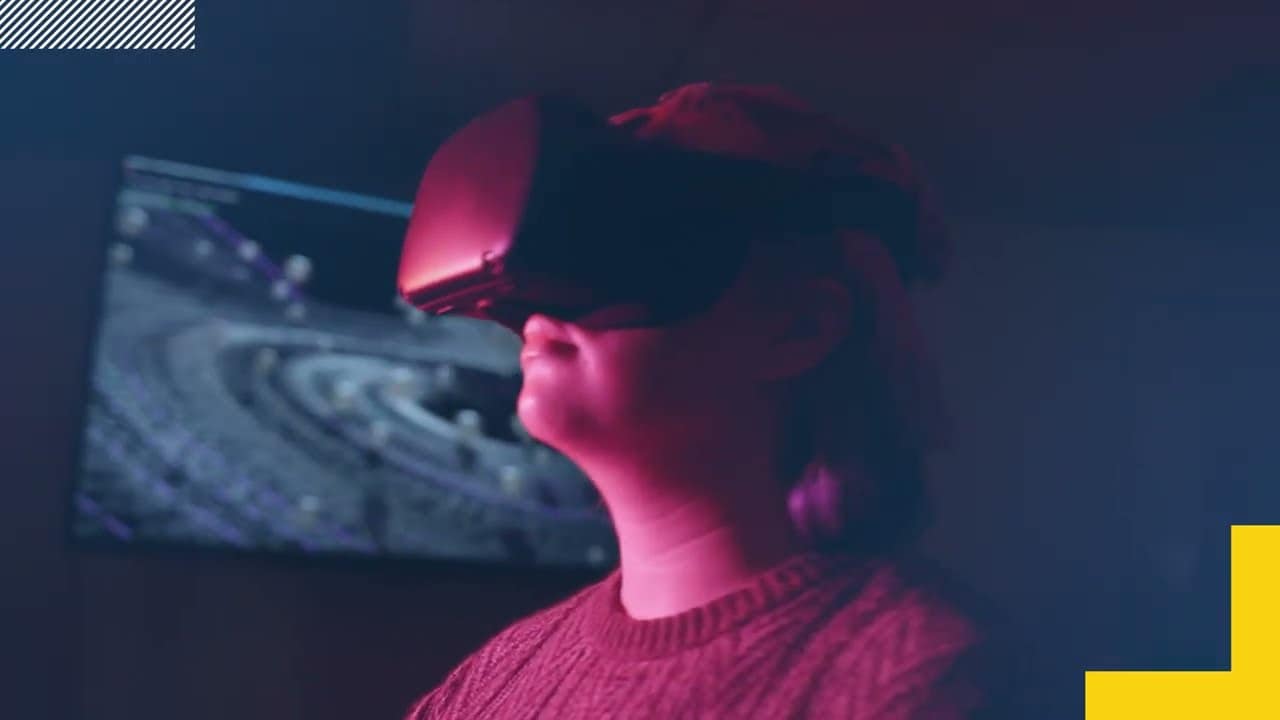
Spotlight
RELATED DEGREES
You may be interested in the following degrees:



